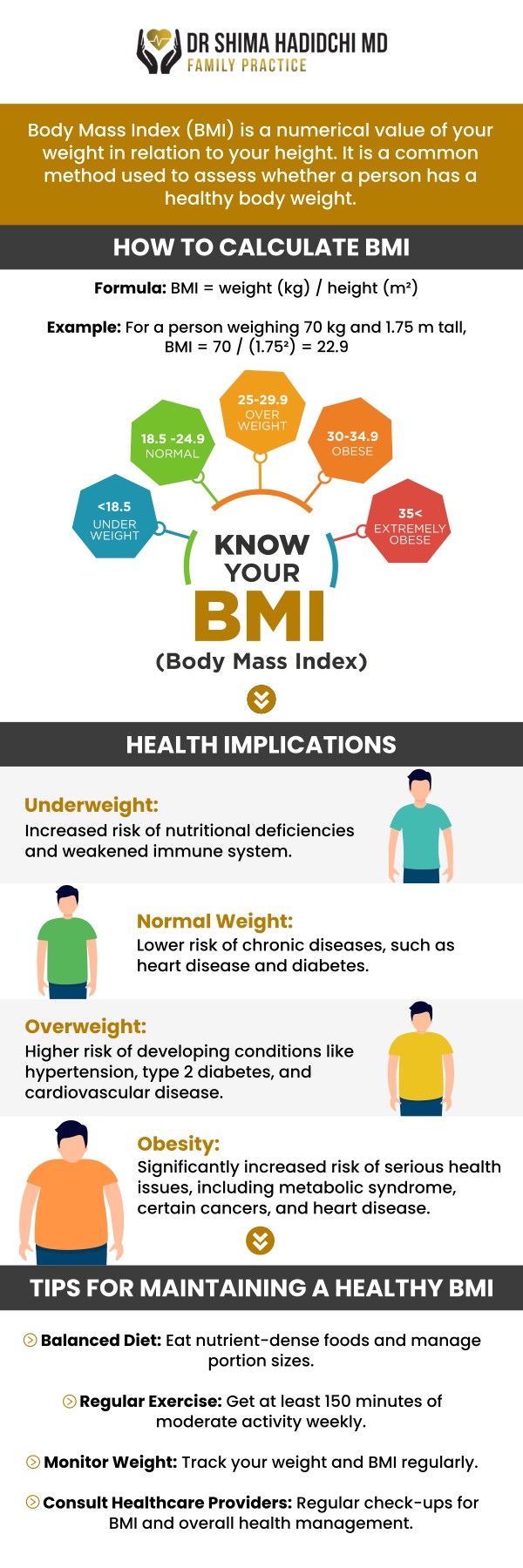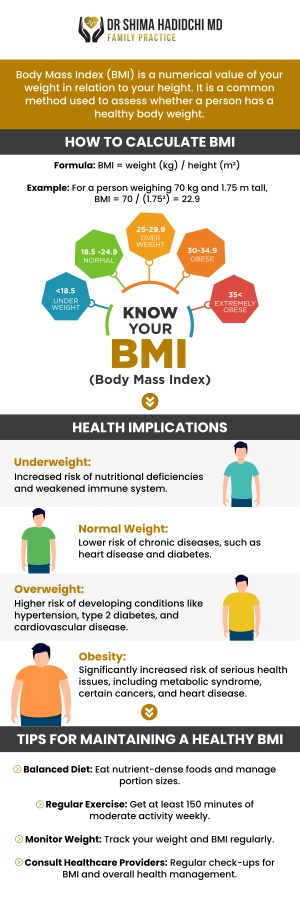How to Use BMI to Assess Your Weight and Health?
BMI acts as an initial screening tool to identify possible weight-related concerns. While it provides a general view of your weight status, it isn’t a diagnostic measure. To gain a more accurate picture of your overall health, it’s essential to consider factors beyond BMI. Dr. Shima Hadidchi, MD uses BMI to assess your weight and overall health. This simple calculation helps evaluate if you’re at a healthy weight, guiding personalized health recommendations. For more information, please contact us today or book an appointment online now! We have convenient locations in Apple Valley, CA and Victorville, CA.


Table of Contents:
What does my BMI mean?
How is BMI used to assess body weight?
How can the BMI chart be used to track health?
Why is BMI an important tool for assessing weight status?
Understanding your Body Mass Index (BMI) is an important step in assessing your overall health. BMI is a simple numerical value that helps you establish whether your body weight falls within a good range based on your height. By knowing your BMI, you can gain insights about wellness concerns you may be at risk of, depending on whether you are underweight, overweight, or obese.
To calculate your BMI, you need two key pieces of information: your weight and your height. The calculation involves dividing your total weight (in pounds) by your height (in inches squared) and then multiplying that number by 703. Once your BMI is calculated, it can be classified into one of four main categories:
• Underweight: Less than 18.5
• Normal weight: 18.5 to 24.9
• Overweight: 25 to 29.9
• Obese: 30 or higher
These categories help assess whether your weight is healthy in relation to your height. For individuals who are overweight or obese, BMI may highlight potential health issues such as heart disease, hypertension, type 2 diabetes, and certain cancers.
However, while BMI provides a general snapshot of your health, it is not a perfect tool. It doesn’t account for factors like muscle mass, bone density, age, or sex. For someone with a greater amount of muscle, their BMI may be elevated despite having minimal body fat. Similarly, older adults may have a lower BMI, despite having higher body fat due to muscle loss over time.
BMI is a straightforward method that helps us categorize your body weight. It serves as an initial indicator of whether you might be underweight, of normal weight, overweight, or obese. BMI also serves as a starting point for understanding your health about your weight. A higher BMI can increase your risk for a range of conditions, such as:
• Heart disease and high blood pressure: Excess weight can put added strain on the heart, increasing the likelihood of cardiovascular issues.
• Type 2 diabetes: Carrying extra weight, especially around the abdomen, can affect your body’s ability to manage blood sugar levels, leading to diabetes.
• Respiratory problems: Overweight and obesity can make breathing more difficult, and these are linked to conditions like sleep apnea.
• Certain cancers: Obesity has been associated with a higher risk of developing cancers such as breast, colon, and liver cancer.
For patients who have a BMI within the underweight range, there may be risks related to malnutrition, weakened immune function, or bone density loss. Doctors will consider your BMI among other factors when evaluating your general wellness.
BMI is a valuable tool that gives us a general picture of your weight status. However, it’s not the only tool we use to evaluate your health. The focus of our dedicated team is to provide you with the most accurate insights to help you keep up with a balanced and healthy lifestyle.
BMI is one of the simplest methods to assess body weight and determine whether someone is underweight, at a healthy weight, overweight, or obese. It’s a straightforward way to screen for potential health risks related to weight.
A BMI within the obese or overweight range, for example, is associated with a heightened likelihood of developing chronic ailments such as cardiovascular disease, stroke, sleep apnea, or type 2 diabetes. However, BMI doesn’t directly measure body fat, and it doesn’t distinguish between fat and muscle.
For instance, athletes with higher muscle mass may have a high BMI despite having low body fat, which means they aren’t at risk for the same health issues as someone with excess body fat. In contrast, older individuals may have a BMI within the normal range but still carry a higher percentage of body fat due to muscle loss.
BMI serves as an initial screening tool to flag potential weight-related issues. While it gives a broad overview of your weight status, it’s not a diagnostic tool. It’s important to look beyond BMI to get a clearer understanding of your overall health.
BMI is a critical tool for assessing whether someone’s weight is within a healthy range. It offers an efficient and cost-effective way to categorize individuals into normal weight, overweight, underweight, and obese categories. These classifications help identify potential health risks.
BMI is also valuable for tracking changes in weight over time, which can be useful for individuals on weight loss or maintenance programs. It provides a standardized measure to assess progress and determine the effectiveness of interventions.
While BMI is helpful, it’s not perfect. BMI can give an inflated estimate of body fat in muscular people and a lower estimate in seniors with muscle deterioration. That’s why it’s essential to use BMI as part of a broader health assessment, considering factors like diet, physical activity, and family history. If you want to learn more about BMI, what it means for your wellness, and how to track it effectively, schedule a consultation session with Dr. Hadidchi. We have convenient locations in Apple Valley, CA and Victorville, CA. We serve patients from Apple Valley CA, Victorville CA, Spring Valley Lake CA, Hesperia CA, Baldy Mesa CA, Mountain View Acres CA, Adelanto CA, and surrounding areas.

Check Out Our 5 Star Reviews


Additional Services You May Need
▸ Telemedicine
▸ Family Practice And Primary Care
▸ Walk-Ins
▸ Weight Loss Management
▸ Zepbound for Weight Loss
▸ Women’s Health
▸ Vaccinations & Immunizations
▸ Diabetes Management
▸ Geriatrics
▸ Pediatrics
▸ Internal Medicine
▸ Acne Treatment
▸ Cryotherapy Treatment
▸ Skin Lesion Removal
▸ Dementia Treatment
▸ Semaglutide GLP-1 Injections

Additional Services You May Need
- Telemedicine
- Family Practice And Primary Care
- Walk-Ins
- Weight Loss Management
- Zepbound for Weight Loss
- Women’s Health
- Vaccinations & Immunizations
- Diabetes Management
- Geriatrics
- Pediatrics
- Internal Medicine
- Acne Treatment
- Cryotherapy Treatment
- Skin Lesion Removal
- Dementia Treatment
- Semaglutide GLP-1 Injections








